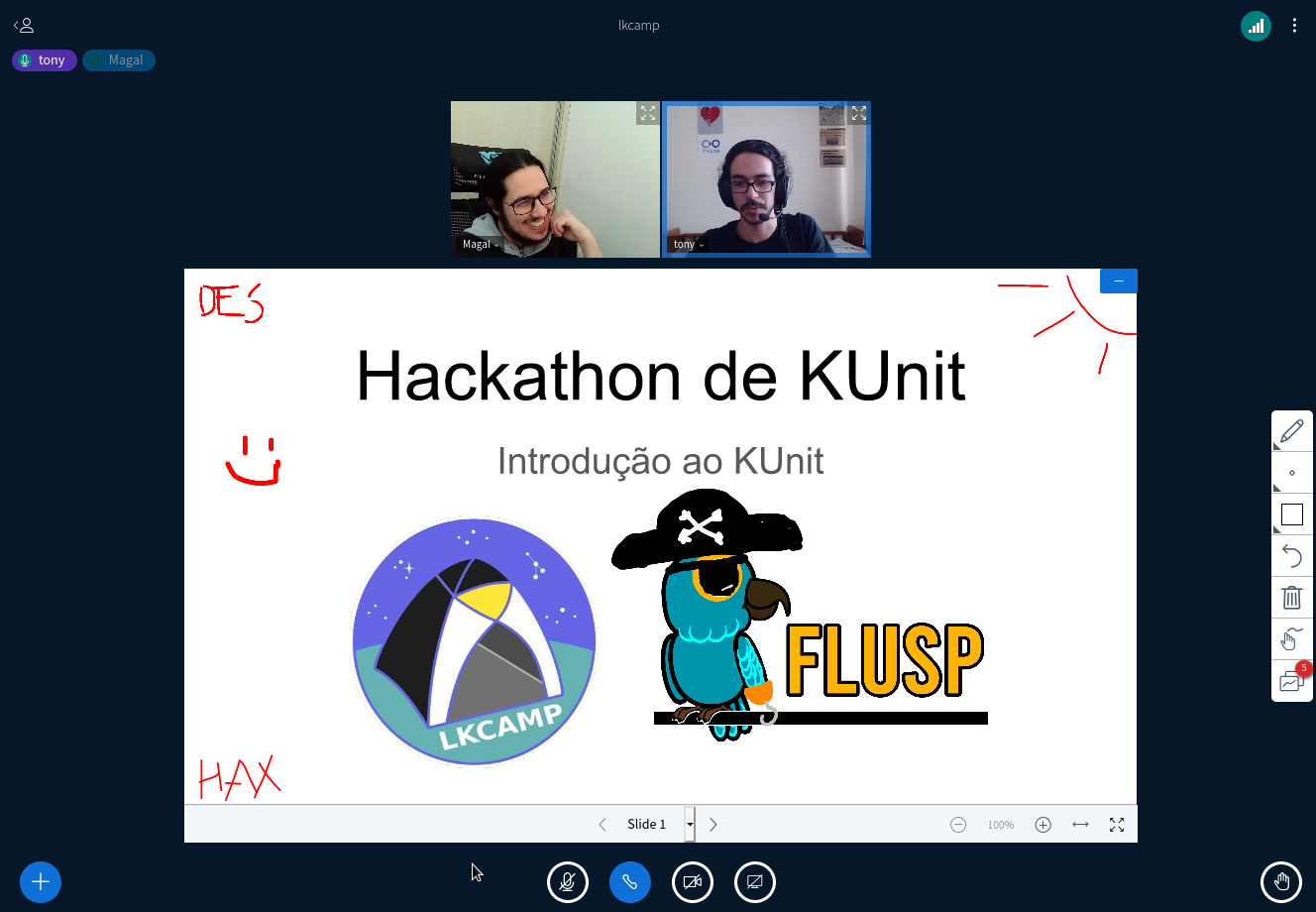KUnit Hackathon
Written by Marcelo Schmitt
Written on , last modified onIn partnership with LKCAMP, we organized a hackathon to encourage new Linux kernel contributors.
On 10th, July we at FLUSP joined with LKCAMP to provide a KUnit Hackathon to kernel practitioners and newcomers. For us at FLUSP, it was a joy to partner with folks from LKCAMP since both student groups are glad to share free software development knowledge and experience with fellow kernel developers. For this occasion, we introduced attendees to the KUnit framework.
What happened at KUnit Hackathon
One week before the hackathon event, we organized a ramp-up day in which we focused on providing background to kernel newbies. The pre-event day included an introduction to the Linux kernel and its development process, along with an introduction to KUnit. Besides our presentations on these topics, we also walked through a KUnit tutorial in the morning. In the afternoon, we discussed patch creation and went through the setup of git in preparation for forthcoming contributions. Lastly, we gave some tips and guidelines on how to compile and runtest the Linux kernel.
On the hackathon day, we started at 9 o’clock with a few slides presenting our student groups, our schedule for the day, and how we would collaborate throughout the event. As well as in past events, we encouraged people to make up pairs or teams as this would likely increase knowledge exchange and possibly make them more productive according to agile development philosophy. With this regard, to provide a means for the attendees to speak to the coaches (and to each other) without disturbing other teams was a great concern for us. Nevertheless, we were able to overcome this problem by making use of a BigBlueButton videoconference room along with a pool of Jitsi rooms for the teams.
After the initial guidelines for the event, we once again went through the KUnit tutorial (this time in a review fashion), then started working on selected issues for this hackathon. For this gathering, we aimed to convert existing runtime tests under lib/, to KUnit standards. We had 4 teams comprising 9 developers working in enhancing test_hexdump, test_hash, test_ubsan, and test_parman tests with KUnit macros. We also had 5 tireless staff members who helped the teams tackle each test conversion throughout the day. The activity was tracked with a kanban on a Riseup pad containing the developers’ names, their Jitsi room, test name, and work progress (WIP, review, or sent to kernel mailing list).
As of the ramp-up day, we had a 1-hour break for lunch at noon. At half-past 15, we made a brief break to acknowledge each team’s progress on the issues they chose to tackle. Most teams kept on coding until we finally have to close the event at 17 o’clock. Unfortunately, the issues chosen by the teams took more development effort than we thought, such that none of them could finish converting the tests on Saturday. However, although we agreed that the work done was not ready to go to the mailing lists, we do believe the developers will be able to complete those improvements in a few more hours of coding. Thus, we encouraged the attendees to continue their work on the changes and participate in our weekly meetings. Overall, it was a day of learning for both attendees and staff developers.
Here are some prints I take during the event. Spotlight on a pirate version of Mr.FLUSP :-]
Slides
Here are the slides we used during the KUnit Hackathon.
Introduction to the Linux kernel
Linux Kernel Development Cycle
Introduction to KUnit (portuguese)
Special thanks
We know that the KUnit Hackathon wouldn’t have been possible without the help of many community members. We would like to give a special thanks to the following people:
- All FLUSP and LKCAMP members who helped with the event organization
- Brendan Higgins
- Daniel Latypov
- Daniel Díaz
Contact:
For more information, feel free to send us an e-mail: flusp@googlegroups.com
Also, have a look at LKCAMP’s website for more content on Linux kernel development.
comments powered by Disqus
 FLUSP - FLOSS at USP
FLUSP - FLOSS at USP


